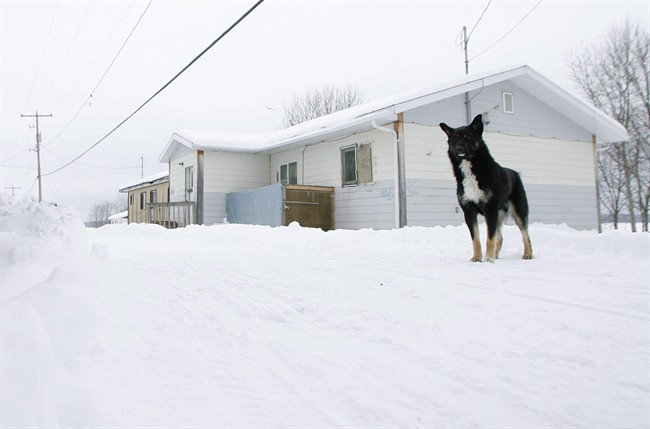An Alberta First Nation that brought in laws to deal with packs of feral dogs says the strategy could be used on other reserves across the country that are struggling with their canine population.

Josh Littlechild, the Tribal Law Officer of Ermineskin Cree Nation south of Edmonton, outlined the steps the reserve took two years ago at the National Animal Welfare Conference on Monday.
“We were having a few issues where dogs were getting aggressive toward our members,” Littlechild said.
Now, the reserve requires registrations and owners to meet a standard of animal care.
“We also have a dangerous dog provision,” he said. “It kind of addresses the whole gamut and the needs of dogs in our nation.”
Dogs running loose are common on reserves, particularly in northern areas. Their presence can be fatal.
READ MORE: 24-year-old woman killed by pack of stray dogs, Manitoba RCMP investigating
Last May, Donnelly Rose Eaglestick of Little Grand Rapids First Nation in Manitoba, was found dead after an animal attack at a construction site. Her body was surrounded by dozens of dogs.

Get breaking National news
In 2007, a five-year-old child was killed by a dog on Cumberland House First Nation north of Saskatoon.
READ MORE: ‘The call for action is now’: Veterinarian, rescue group asks government for help after dog mauling
Leah Arcand, who teaches at Thunderchild First Nation northwest of North Battleford, Sask., said she currently cares for 14 dogs. Two of them are hers permanently and the others she is fostering and finding new homes.
She said animal welfare organizations are helpful in many instances.
READ MORE: Alberta community held hostage in their homes after wild dogs attack
“Like all animals, there are a lot of stray dogs guaranteed in every First Nations community that need your help. Just by donating food or getting the dogs spayed or neutered certainly helps a lot,” she told delegates.
“I know at Thunderchild for sure there are some wild, stray dogs who become very aggressive because they don’t have the care that they need or the food that they need.”
Littlechild said there isn’t an easy answer for every First Nation but has shared his story with other chiefs who are open to the idea.
“For First Nations, I think it would be a great approach to employ a law in each band’s constitution that addresses the need for animal welfare and dog welfare in particular,” he said.
READ MORE: Reserve dogs and cats saved from cull in northern Saskatchewan
Littlechild encouraged animal groups to reach out to the leadership in each reserve before venturing onto traditional property and to not come with preconceived notions.
“Free-roaming dogs don’t necessarily mean that our dogs are not cared for.
“We have dogs that belong to households that free roam during the day and come home at night and sleep and eat and others belong to one family or multiple families,” said Littlechild.
“That’s part of the reason why our law was so important. We were finding a lot of rez dogs were ending up on homes off the reserve being scooped up because they’re seen as strays.”






.jpg?h=article-hero-560-keepratio&w=article-hero-small-keepratio&crop=1&quality=70&strip=all)
Comments
Comments closed.
Due to the sensitive and/or legal subject matter of some of the content on globalnews.ca, we reserve the ability to disable comments from time to time.
Please see our Commenting Policy for more.